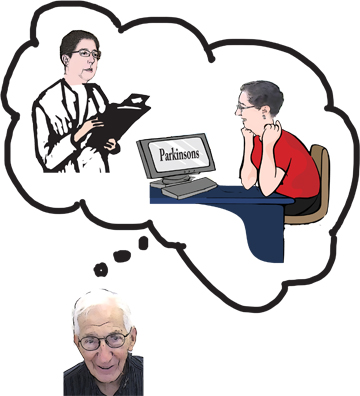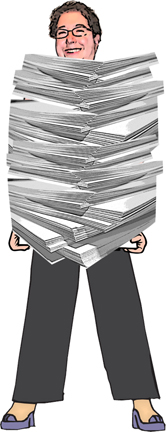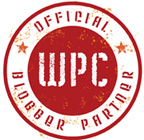Who knew I'd become a "half-assed doctor"? |
| My father tells people that I’m “a half-assed doctor.” He means it in the best possible way, using it as a selling point when encouraging people to contact me with questions about living well with Parkinson’s disease. It’s hard to put a positive spin on an expression that means “incompetent,” but my dad pulls it off. He bestowed this title on me in recognition of the thousands of hours I’ve logged trying to keep up with the latest treatments, clinical trials, and research findings related to Parkinson’s. Plowing my way through medical journals, news publications, and web sites sponsored by Parkinson’s organizations and hospitals has been a long, hard road to hoe and a tremendous education.  I guess I should have paid attention in high school biology and chemistry classes instead of passing notes to friends. I was certain back then that I would never need to know anything about science once I graduated. After all, I was going to be a journalist and science was unlikely to be my beat. What I didn’t count on was that one day I would be diagnosed with a chronic, incurable illness. top |
It was my neurologist who encouraged me to learn all I could about Parkinson's so I could better participate in decision-making about my treatment. She had no idea where this would lead. If she had, she may not have suggested it. It has been said that looking for health information on the Internet is “like hunting for wild mushrooms. If you know where to go and what to look for, or if you have a trusted guide, you can go home with some real treasures -- all for free. But if you pick wrong, you can get sick and die.” At the very least, you can convince yourself that you very are sick and about to die. On more than one occasion I have searched on vague symptoms to diagnose what ails me, quickly turning an ordinary headache into a brain tumor. “Symptom surfing,” is so prevalent that it has a name, “cyberchondria,” the online equivalent of hypochondria. A little bit of knowledge can be dangerous. I come for my office visits bearing an  extensive list of questions and a ream of articles printed from the Internet… just in case my doctor missed some news I consider important. I’ve sought her opinion on everything from whether eating beef jerky can really boost brain and memory function to whether I should take up smoking in case nicotine really is beneficial. She jokes that she prepares for my visits by pulling “all nighters” with her colleagues, anticipating my questions and memorizing the answers.
If it were available, I’m sure my “book” learning combined with my life experiences would qualify me for an online medical degree. extensive list of questions and a ream of articles printed from the Internet… just in case my doctor missed some news I consider important. I’ve sought her opinion on everything from whether eating beef jerky can really boost brain and memory function to whether I should take up smoking in case nicotine really is beneficial. She jokes that she prepares for my visits by pulling “all nighters” with her colleagues, anticipating my questions and memorizing the answers.
If it were available, I’m sure my “book” learning combined with my life experiences would qualify me for an online medical degree.My doctor agrees. “When the cure is found, I am certain I will hear it from you first,” she tells me.  |
email us directly at: Sheryl@pdplan4life.com (c) 2015 PDPlan LLC All Rights Reserved Without express written consent, this material may only be used for your own personal and noncommercial uses which do not harm the reputation of PDPlan LLC, provided that you do not remove any copyright. To request permission to reproduce, please contact PDPlan LLC at Sheryl@pdplan4life.com |
 |
 |
